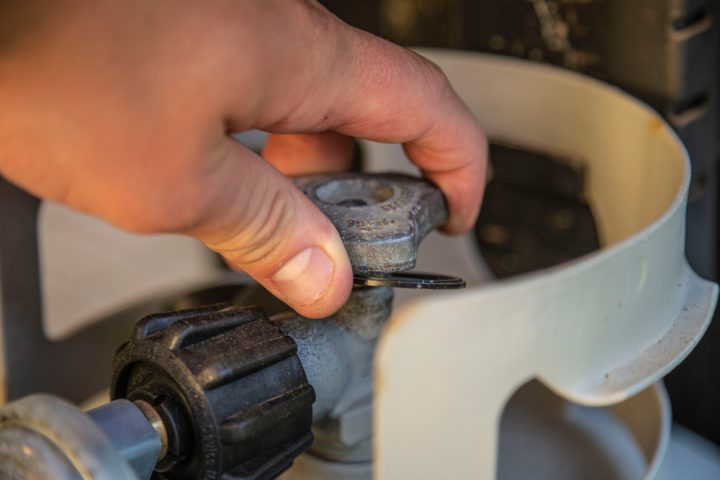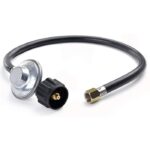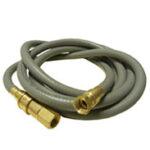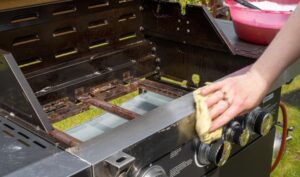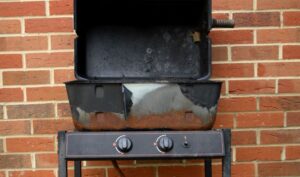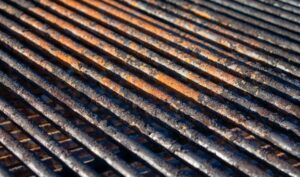The Complete Guide to Troubleshooting Gas Grill Issues is your source for step-by-step instructions on how to diagnose and fix the most common gas grill issues. Whether your grill isn’t heating properly, won’t stay lit, or simply has rusty parts, we’ve got the answers you need to get your gas barbecue firing on all cylinders.
Cooking with gas doesn’t mean you should be smelling gas. A bit of smell is normal when you first fire up your barbecue, but if your grill smells like gas for longer than a few seconds, that could be a sign that you have a gas leak.
There are a few different reasons why you may be smelling gas when using your propane or natural gas grill. In this section of the Complete Guide to Troubleshooting Gas Grill Issues, we’ll help you figure out why you’re smelling gas and how to fix it. Keep reading to learn more about:
- Should you smell propane while grilling?
- Reasons you may be smelling gas
- How to check your grill for a gas leak or loose connection
Let’s get cooking.
Should You Smell Propane While Grilling?
No, you should not smell propane while grilling. A bit of odor when you first light a gas grill is normal, but if you continue to smell gas while cooking, you should immediately turn off your grill and shut off the fuel line before proceeding.
4 Reasons You May Smell Gas
There are a few innocuous reasons why you may be smelling gas while firing up and operating your grill:
- When you are starting your grill, you may smell gas briefly before the propane ignites.
- If your tank is running low, you may smell the chemical they add to the propane to alert you to a gas leak (called mercaptan, aka methanethiol). Mercaptan is slightly heavier than propane, so it smells more when you’re reaching the bottom of the tank. Before you start inspecting fuel lines and hose connections, check that the fuel gauge is giving you an accurate reading —a full tank of propane weighs close to 38 lbs. An empty tank is closer to 18lbs.
However, if you continue to smell gas after replacing or refilling your tank and lighting your grill, then the issue is likely one of the following:
- The fuel line is not connected properly
- You have a gas leak, typically from a damaged or old fuel line
The method for checking these issues is the same.
How to check your grill for a gas leak or loose hose
- Make sure your gas supply is turned off and all control knobs are in the OFF position.
- Inspect all hoses on the grill, looking closely for signs of deterioration such as cracking, abrasions, holes, or tears. Ensure all the hoses are tightly connected and that there are no sharp bends or kinks in the gas line.
- Inspect the gas tank for rust, dents, bulges, corrosion, punctures, or other signs of damage.
- Mix a 50/50 solution of water and dish soap and apply it to the gas hose and connections points with a spray bottle or with a clean basting or paint brush.
- Open the gas supply, but do NOT turn on the control knobs or light the grill. Do not smoke while testing for gas leaks.
- Inspect the hose and connection points. If you see growing bubbles forming at any point this indicates a gas leak.
- If you see bubbles coming from a connection point, disconnect and reconnect your hose, taking care to tighten the connection as much as possible. Run the test again.
- If you see bubbles coming from the hose itself, you need to replace the hose.
Turn off the gas supply.
Shop replacement hoses:
Conclusion
If you smell gas while operating your grill, it is likely caused by one of the following issues:
- You may smell gas briefly before the propane ignites. This is normal and no cause for concern.
- Your propane tank is running low
- The gas line is not connected properly
- There is a gas leak
Learn more about different grill problems, what causes them, and how to solve them in our Complete Guide to Troubleshooting Gas Grill Issues:

